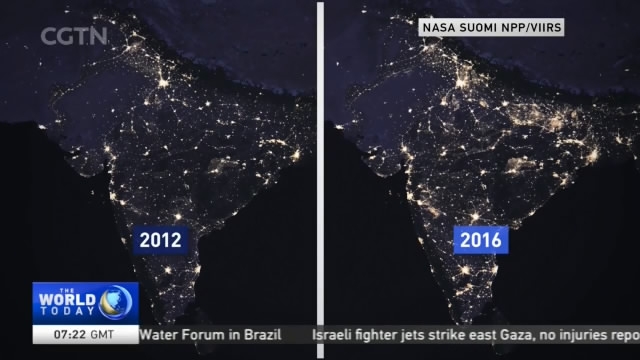
16:07, 18-Mar-2018
Losing The Night: Excessive artificial lighting is slowly 'polluting' the planet

Stop and look up at the sky tonight. Chances are you'll barely be able to catch a glimpse of the stars. Recent night images from NASA show our world flooded in light. And experts say it's only growing stronger. CGTN's JIM SPELLMAN tells us how turning on the lights isn't always a bright idea.
It's several hours after sundown in Washington, D.C.'s DuPont Circle neighborhood yet it's nearly as bright as day, perpetual twilight with plenty of artificial light.
JIM SPELLMAN WASHINGTON "We're in downtown Washington, D.C, filming a TV interview at night with just the existing lights, there are people outdoors playing chess. It's like being indoors!"
JIM DOUGHERTY INTERNATIONAL DARK-SKY ASSOCIATION "Right, This is a place we love to hate. There are lights there, globe lights on both sides, floodlights. They are all thrown in without regard for the other lights."
Jim Dougherty of the International Dark-Sky Association says all that light is damaging human health.
JIM DOUGHERTY INTERNATIONAL DARK-SKY ASSOCIATION "If you don't sleep in a dark room you are probably going to sleep more poorly which could affect your behavior, your weight, and we know that if we suppress melatonin production, which it does, melatonin is a powerful anticancer hormone, so there is reason to believe it is increasing cancer risk."
In addition, nature is affected by all the extra light: Plants bloom earlier in the year. Animals can become confused about whether it's night or day. Some insects are attracted to lights instead of pollinating flowers.
JIM DOUGHERTY INTERNATIONAL DARK-SKY ASSOCIATION "You affect the whole ecosystem by lighting up the night."
These images from NASA satellites show the world getting brighter. From 2012 to 2016, artificially lit areas of the world grew by more than two percent a year. As the planet gets brighter, more scientists are paying attention.
BILL NYE SCIENCE EDUCATOR "We can't see the stars at night, and when we can't see the stars, we are not aware of our place in the cosmos. We lose sense of our place in space."
But it won't be easy convincing people to turn off the lights.
JIM DOUGHERTY INTERNATIONAL DARK-SKY ASSOCIATION "People don't want smart. People want more light. Humans are naturally afraid of the dark."
But experts say there are fixes: Urban planning to avoid unnecessary lighting, motion detectors so lights are only on when needed and lights angled down where people need them instead of up toward the sky.
JIM SPELLMAN WASHINGTON "And all this light wastes a lot of energy. The International Dark-Sky Association estimates that global electricity use could drop by one percent if outdoor lighting was reduced. That could help meet the goals of the Paris climate accord and reduce global warming. Jim Spellman, CGTN, Washington."

SITEMAP
Copyright © 2018 CGTN. Beijing ICP prepared NO.16065310-3
Copyright © 2018 CGTN. Beijing ICP prepared NO.16065310-3